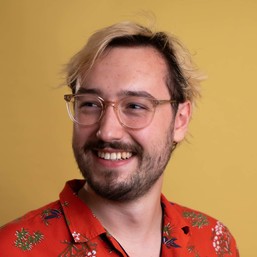
UvA buildings | “People easily get lost in the UB”
Max Haring is head of teaching and research support at the UB. He deals with all matters not related to study and research. “Making a substantial contribution to research without doing it myself is what I like about my job.” Part two of a two-part series about the UB.
As a student, you will not easily bump into Max Haring, head of information services for research and education at the UB, in the building on the Singel. That is, unless you get lost and accidentally end up in a part of the building that looks like it was built before the 1960s. Before you know it, you are walking among the offices of UB employees. “People who don’t yet know their way around here often get lost,” Haring says.

Most students and staff don’t come to the Singel to borrow books or magazines. “Students come to study, but doctoral students, for example, much less so. In my department, we have nothing to do with the books or bookshelves of the UB,” Haring said. “We try to make it as easy as possible for people at the UvA to use all the information at the library. For example, we help researchers with searching and browsing databases, and with their publications.”
Research support
Following his PhD in biochemistry at the UvA, Haring worked at various publishers and scientific journals. For the past four years, he has been working at the UB. “It was nice to come back. It is quite interesting to work at the UB as someone with a more scientific background. The library attracts a lot of historians and linguistic scholars, and you find that sometimes you approach things differently, and that’s often very instructive.”
Haring is glad he is no longer directly involved in research himself. “I really enjoyed it during my PhD, but now I find it more enjoyable to support other researchers. This way I can still make a substantial contribution to the success of UvA research. And assist in promoting great stories and interesting research results.”
“Also, many students and staff don’t know what the library is all about,” Haring said. “For most students, providing study places is the UB’s most important role. But we do more. For example, registering theses, helping students with source research, and giving workshops. There is a lot of demand from lecturers and students for the digital skills workshop. This is currently only available to lecturers, but we want to make it available to students as well. Then lecturers can focus more on the content and students can also get support from us.”
Moving to a new UB
Herring is excited about moving to the new UB in the University Quarter. “The current building is starting to get very cramped. Increasing the capacity in terms of study places is certainly an important reason for the move. There will also be more space for events and presentations and also for us to support people.” He is also looking forward to the air conditioning. “When it gets hot, the windows here can only open or close, and there is no air conditioning.” And regarding the location: “Being in the middle of the city gives the current UB a lot of atmosphere. Since the new UB is made up of three old buildings, I am curious to see what the atmosphere there will be like. There will be plenty to explore, I think.”

